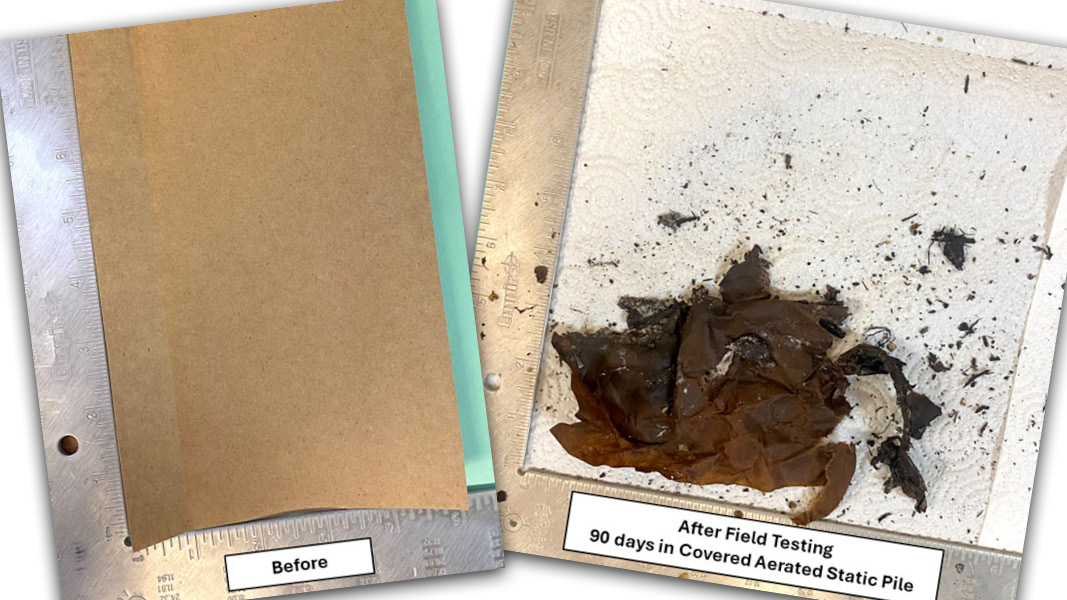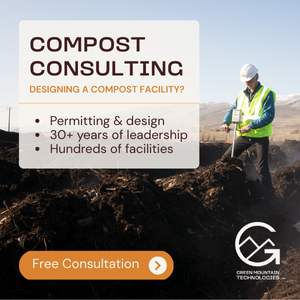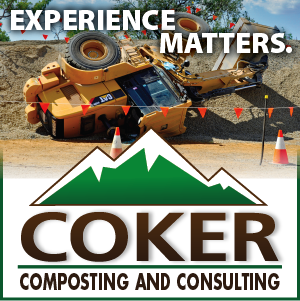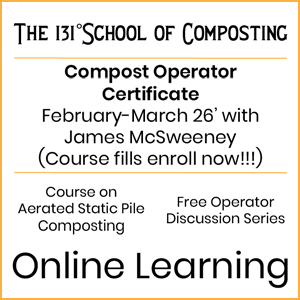Top: Kraft paper control, before (left) and after (right) composting. Photos courtesy Emily McGill
Emily McGill
Single-use plastics and food packaging are a focal point in the global conversation on sustainable waste management. Food packaging made with conventional materials is difficult to divert from landfill once food-soiled. Certified compostable packaging is a promising alternative, designed to divert both food waste and packaging into organic waste streams destined for processing at composting facilities.
This circular economy potential depends on those products being verified to break down at composting sites, and on composters being able and willing to accept those products. Although the compostable packaging industry has developed and grown alongside the composting industry for decades, there remain barriers to widespread acceptance by composters.
Challenges Facing Compostable Packaging
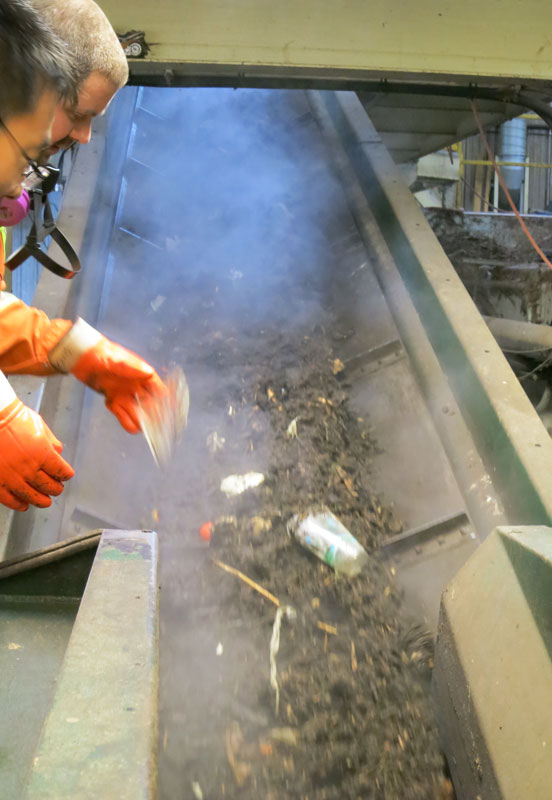
Researchers oversee the feedstock that’s been dosed and mixed with compostable packaging, as it is conveyed into a tunnel for composting.
Contamination in the organics stream from non-compostable items is one of the most pressing issues facing organics processing facilities. Many compostable products resemble conventional plastics, leading to confusion among consumers, and difficulty for composters to distinguish between compostable and non-compostable items once they get to their site. Non-compostable items inadvertently mixed into otherwise compostable waste can disrupt the composting process and lead to higher operational costs for facilities tasked with separating these materials.
Another challenge is the gap between lab-based compostability tests and real-world performance. Laboratory tests are important to verify that a product will biodegrade and disintegrate under composting conditions, but the conditions for lab tests, like feedstock, moisture, and temperature, are kept constant through the test, and the test duration is up to 180 days.
In contrast, composting facilities face daily fluctuations in temperature and moisture, and retention times vary widely across facilities, with many sites completing active composting within six weeks or less. As a result, materials certified as “compostable” via lab tests may not break down as effectively in a real composting environment. This gap highlights a role for field testing to assess how compostable products tested in the lab actually behave in facilities’ composting piles.
Field Testing Bridges A Gap
Field testing compostable packaging disintegration under real-world conditions has been in practice as long as compostable packaging has existed. However, the majority of field testing has been conducted by private companies, and with some exceptions, the results have not been disclosed to the public. This privacy poses a challenge in using field testing as a feedback mechanism between lab standards, composters, product designers and policymakers.
The Compostable Field Testing Program (CFTP) was established in 2016 as a nonprofit research project to address this challenge by providing open-source field testing data on compostable packaging. Founded by the Compost Research & Education Foundation (CREF) and BSIbio, the CFTP has worked with composters across North America to gather field test data under a range of environmental, technological and composting conditions.
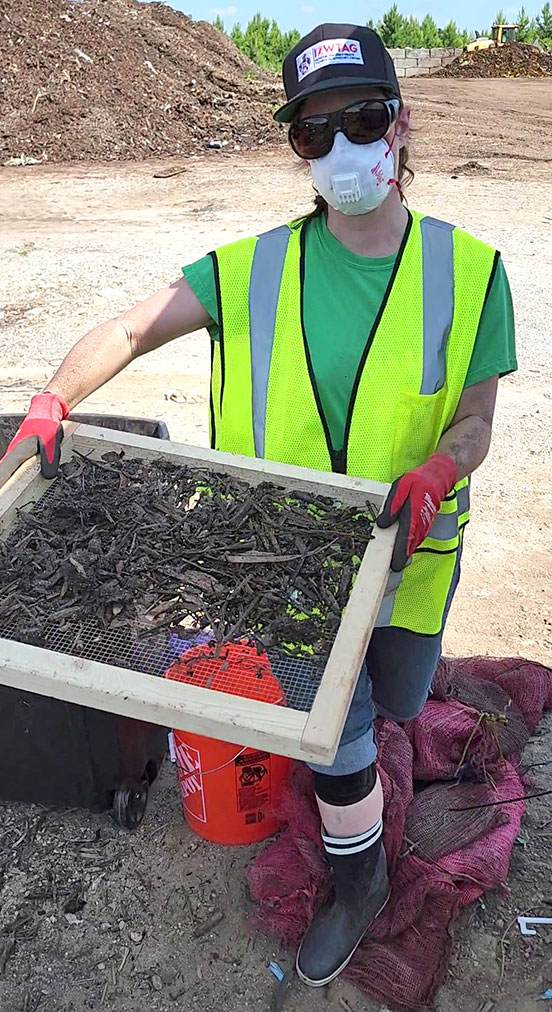
Sifting the material in the mesh bag test is how residuals from products are recovered and analyzed for disintegration.
By field testing common compostable products across diverse facilities, the CFTP provides valuable insights into how these products disintegrate under variable conditions. Importantly, the operating conditions gathered under the CFTP’s data collection platform are correlated with product disintegration.
The data can be explored in an interactive graph through CFTP’s newly launched website, making it accessible to anyone interested in compostable packaging, from researchers to waste management professionals. Users can view the results by the test method used, material type, item type, or composting conditions, such as primary composting technology, average temperature, moisture, or trial duration.
As the public database of field testing results grows, field testing is poised to fill essential data gaps that can guide decisions across the compostable packaging lifecycle. For individual composters, field testing data helps determine which products are suitable for their specific facilities, reducing the risk of contamination and operational inefficiencies. For compostable product manufacturers, the data offers insights into how their products perform outside of controlled lab environments, allowing them to improve designs and create packaging that better aligns with real-world composting processes.
Policymakers also benefit from publicly available field testing data that complements lab-based standards and accompanying certifications by correlating disintegration to specific, real-world composting conditions. Policies grounded in this research can better account for the diverse realities of composting facilities to support a circular economy without overwhelming composting systems.
Standardizing Field Test Methods Through ASTM International
As compostable packaging gains popularity, there is a growing need to create standardized testing methods that all stakeholders can rely on. The CFTP has been actively collaborating within ASTM International, a globally recognized standards organization, on a standardized field test method for compostable packaging disintegration under defined composting conditions.
This cross-sector collaboration is a step toward creating a uniform field testing framework that can be adopted by composters, manufacturers, and regulators alike. It marks a milestone in the refinement and evolution of field testing towards consistent, transparent test methods that provide reliable data on product performance across different composting operations.
Key Takeaways For Stakeholders
For stakeholders looking to leverage CFTP data, it’s essential to understand the nuances of field testing findings. The high-level takeaway from the CFTP’s data is that the certified compostable products that have been field tested — whether compostable biopolymers or fiber-based — do show complete disintegration in field tests, but the results vary widely. The data really demonstrates the critical importance of composting conditions — primarily temperature, moisture, and time — in determining how well compostable products disintegrate.
This substantiates the challenge that the compost industry faces with existing compostability certifications; products that perform well at one facility may face difficulties breaking down in another due to variations in operating conditions. Though this validates the existing landscape of tailored acceptance policies at composting facilities, it also confirms the barrier to harmonized policies on compostable products across sites and regions.
As more field testing data is gathered, more exact correlations between real-world composting conditions and compostable product disintegration can be made. This knowledge can help inform composters aiming to optimize their operations for these feedstocks, guide manufacturers in designing compostable products that disintegrate effectively and help them communicate the conditions required for their breakdown, and provide policymakers with a stronger foundation for regulations that support an effective circular economy.
More To Come From The CFTP
Later this fall, the CFTP will be publishing the test methods used to collect the data, as well as a report that digs deeper into the field test results and interpretation. The website will act as a platform for future publications. This open-source approach reflects the CFTP’s mission to support the composting and packaging industries with accessible, reliable information.
The remaining articles in this series will delve into the specifics of field testing methods, results, and future directions for this work. By making this information available to the public, the CFTP aims to empower stakeholders to stay informed and actively participate in the evolution of compostable packaging standards.
Emily McGill is Program Director for the Compostable Field Testing Program (CFTP), via her role with BSIbio Packaging Solutions, one of the founding partners of the CFTP. Emily has directly facilitated or remotely supported over 20 field tests, and has used her experience to help lead the development of refined and standardized test methods under ASTM International.


